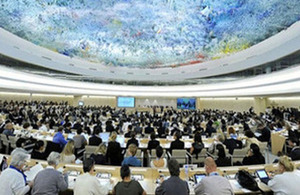Human Rights Council, 30th Session: United Kingdom of Great Britain & Northern Ireland, Statement under Item 3
Interactive Dialogue with the Special Rapporteur on Contemporary Forms of Slavery, including its causes and consequences.

United Nations, Geneva, Switzerland
Thank you Mr President
The United Kingdom supports the earlier European Union statement and would like to address some additional remarks to the Special Rapporteur on Contemporary Forms of Slavery.
Ms Bhoola, as main sponsor of your mandate we would like to express our sincere appreciation for your work and your latest report.
We would also like to welcome the co-operation given by a number of states over the last year and welcome in particular your visits to Niger and Belgium.
Contemporary slavery is a despicable and inhuman violation of human rights in which women, men and children are subjected to unimaginable suffering.
It is a phenomenon that persists in all parts of the world and it is vital that states from all regions increase their efforts to tackle this appalling scourge.
Since your last report the UK has passed landmark legislation to combat contemporary slavery the Modern Slavery Act 2015 - the first of its kind in Europe, and one of the first in the world, to specifically address slavery and trafficking in the 21st century.
This new legislation significantly enhances support and protection for victims, gives law enforcement the tools they need to target today’s slave drivers and ensures perpetrators can be severely punished. The 2015 Act also includes provisions for a new Independent Anti-slavery Commissioner who will act strongly in the interests of victims - and potential victims - by making sure that the law enforcement response to modern slavery is focused, coordinated and effective.
We are grateful that you have focused your report on supply chains – an issue which is central to tackling contemporary slavery. The Modern Slavery Act contains a groundbreaking measure on transparency in supply chains . This recognises the important role business can play in tackling slavery and encourages them to do more. The requirement for businesses to disclose what they are doing to eliminate slavery in their supply chains, will provide a strong incentive for businesses to take this issue seriously.
We would like to ask whether you intend to maintain a focus on this issue throughout the course of your mandate and whether you aim to work in cooperation with business to identify effective strategies of engaging the private sector to address slavery in supply chains?
Ms Bhoola, we thank you in advance for your response and look forward to discussing these issues with you in further detail at a side vent on this topic which the UK is co-sponsoring with a range of partners at noon on 16 September.
Thank you Mr President.